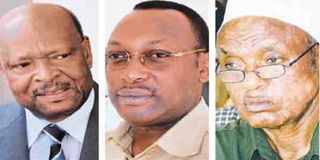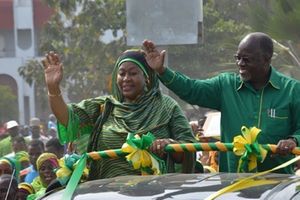Term limits: These men in need of a stopwatch?

What you need to know:
- Political analysts say the Tanzanian opposition faces a huge challenge to strengthen intra-party democracy if it has to survive.
- Of late, the social media has been in a frenzy, laying bare what many could be feeling about the need for term limits to not only reassure voters, but also arrest a situation where political parties are built around individuals.
Dar es Salaam. In the midst of the turbulence that the opposition movement in Tanzania currently faces, debate is slowly resurfacing on whether or not it’s the appropriate moment to openly talk about leadership renewal.
Political analysts say the Tanzanian opposition faces a huge challenge to strengthen intra-party democracy if it has to survive.
Of late, the social media has been in a frenzy, laying bare what many could be feeling about the need for term limits to not only reassure voters, but also arrest a situation where political parties are built around individuals.
Those pushing the agenda for time-limited roles for opposition leaders argue that it enhances efficiency, minimise the opportunity for corruption and centralisation of power within a single individual.
“It’s the rule of law, not the rule of a strongman or woman that must apply to the opposition as well,” argues University of Dar es Salaam political science lecturer Bashiru Ally.
He cites a provision in the Political Parties Act of 1992 which states that party constitutions should spell out leaders’ term limits.
However, that is not the case with Tanzanian opposition parties. “They obviously lack democracy, and it seems the top leadership is holding on to their positions for self-aggrandisement,” says Mr Ally.
Fueling the debate is the dramatic power struggle choking one of the country’s main opposition parties – the Civic United Front (CUF). After his resignation as chairman last year, Prof Ibrahim Lipumba made a shocking U-turn in June to seek re-instatement as the party’s leader.
When he resigned just before the general election, Prof Lipumba, an economist, pledged his continued allegiance to CUF, saying that he would continue as a member and contribute to the economic thinking of the party. He added that he would take part as a rank and file member of CUF.
In his resignation statement, he also talked about his personal ineffectiveness within his own party when he talked about him “seeming to be a hindrance to progress”.
His stance, and statement, were taken by some political pundits as a sign of maturity for the opposition that has progressively become a potent force on mainland Tanzania.
But a year later, Prof Lipumba has come back to the fold – suggesting that his resignation was a mistake and now he wants his post. It has since been twist and turns with party leadership blocking his bid.
The drama has helped renew debate on democracy within the opposition.
There are fresh calls for leaders not to stay in office to seek their own power, but to implement sound principles and to benefit all the people, and then pass the torch to the next generation of leaders.
“This argument that they must first institutionalise their parties before initiating and implementing the term limit provisions does not hold water – stronger institutions can be built within a democracy,” argues Mr Ally.
Prof Kitila Mkumbo of the University of Dar es Salaam (Udsm) agrees. He says term limits are not any option in a functioning democracy, and opposition leaders should walk their talk.
“If the Constitution has similar demands for national leaders, who are obliged to pass on the baton after two consecutive terms of five years each, the same should apply to any other political party,” he tells Political Platform in an interview.
According to the professor, the problem with politicians within the opposition was their tendency to think that just because they “have invested a lot in terms of time and resources”, no one should tell them to step down for others.
“Parties are divided along followership of individuals. This has plunged the opposition into disputes. The onus is on leaders to invest more in educating members to respect and prioritise party constitutions, not individuals,” he says.
Politics of patronage
Many political scientists are of the opinion that without clear term limits, the curse of patronage politics checks in, and with it crippling ills such as vote-buying, corruption, political dynasties —which, for the opposition, hinder attempts to grow into a potent force against the well-oiled and well-organised ruling establishment.
Amendment of laws governing the parties would also be necessary to remove the curse of leaders turning themselves into careerists at a time when reforms are desperately needed, analysts suggest.
“The institutionalisation of liberation parties after independence saw founders stepping down like what Mwalimu and Mandela did. But there are cases of where it took long, like what Cuba’s former president Fidel Castro and others did. Others don’t quit as is the Zimbabwean President Robert Mugabe’s case,” says Prof Mkumbo.
Each time the topic of term limits has been introduced in the opposition over the years, it has always been dropped like a hot potato – but not before ruffling feathers.
It was long cited as the major reason for the storm in Chadema that led to the departure of one of the party’s most prominent young politicians, Zitto Kabwe, who is now the leader of a new opposition outfit – the Alliance for Change and Transparency (ACT-Wazalendo).
Many decried “authoritarian elements” within the opposition that hit back after the outspoken politician, once the Chadema deputy secretary general, openly criticised bad governance and sought to take over party leadership.
Kabwe had expressed his interest to vie for Chadema chairmanship, leaving himself on a collision course with incumbent chairman Freeman Mbowe. The then Kigoma North lawmaker was dragged to the party’s Central Committee.
He was stripped of his party membership, and later decided to plot his next political strategy with ACT Wazalendo. Ironically, the new opposition party is reportedly having its fair share of similar trouble.
Before that, in NCCR-Mageuzi, a similar fight threatened to bury the then most popular party in 1992 after chairman Augustine Mrema resisted attempts at leadership reforms spearheaded by his then secretary general Mabere Marando.
“That is (also) how Mrema (Augustine) and Marando (Mabere) sparked a huge dispute when leading NCCR-Mageuzi in the early 1990s. It’s what we are seeing Mbowe (Freeman) who considers himself to have invested a lot of resources within Chadema; it’s the same challenge facing CUF,” Prof Mkumbo says.
In CUF, the current leadership wrangle pits secretary general Seif Shariff Hamad’s supporters who have moved to block Prof Lipumba’s shock comeback bid.
The party’s supreme governing has suspended the economics professor and deputy secretary general (Mainland), Magdalena Sakaya, together with nine other members.
Financial woes have been cited as one of the major reasons it would be difficult for Tanzanian opposition parties to set and adhere to term limits.
It’s a case of ‘he who pays the piper calls the tune’, observes United People’s Democratic Party (UPDP) national chairman Fahmy Dovutwa.
“Most of the individuals who cling to power are the ones providing the money, directly or indirectly,” he tells Political Platform.
He adds: “I completely support the idea to clear term limits through democratic elections. But the lack of financial support and dependence on individuals will make it an almost impossible dream.”
Mr Dovutwa singled out Tanzania Labour Party (TLP) chairman Augustine Mrema, Prof Lipumba and CUF secretary general Hamad, United Democratic Party (UDP) leader John Cheyo and Peter Mziray of the APPT- Maendeleo, saying they should consider passing on the baton after leading their parties for many years.
Chama Cha Kijamii (CCK) secretary general Renatus Muabhi says it is not healthy for democracy to have one leader staying in power for “so many years”.
“It is an outdated system that does not guarantee accountability. People must lead knowing that they will leave at a specific point – this can help them perform better,” says the CCK leader.
Prof Gaudance Mpangala of the Ruaha Catholic University (Rucu) notes that leadership renewal in the opposition is long overdue.
“The current party leaders must learn from Mwalimu Nyerere whose leadership had done a lot for the country and was still respected at the time he pronounced his decision to step down in 1985.”




